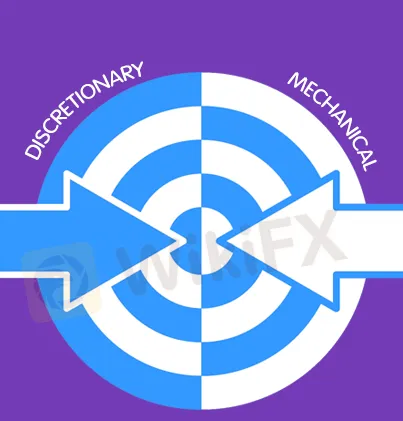What Is a Hybrid Market?
Abstract:A hybrid market is an exchange where traders may conduct deals using both automated trading tools and conventional floor brokers. The New York Stock Exchange is the most well-known example of a hybrid market in the United States (NYSE).
Market participants in hybrid markets can select between fully automated electronic exchange systems and human floor brokers who execute deals on the actual trading floor. Despite the fact that both techniques have merits and limitations, there has been a recent trend toward completely computerized order fulfillment.

The advantage of hiring floor brokers is that they may use human judgment in the way and time in which they enter deals, despite the fact that they are slower and more expensive than entirely computerized systems. In general, they are only used by large institutional clients and a select few high-net-worth individuals. In order to make deals that are delicate in nature, these customers may need to rely on the human judgment and experience of a floor broker.
Investors placing big orders, for example, may wish to keep their order from becoming public information so that other investors do not attempt to front-run the transaction. Floor brokers could be able to help with such a deal by scouring their network of institutional customers for possible counterparties.
Clients may also rely on floor brokers' skills to spread out their trade executions across time in order to avoid impacting the price of the securities while the deal is being completed. For example, if an investor desires to acquire a large number of shares in a sparsely traded firm, putting the full purchase through a single order may cause the price to rise before all of the shares can be purchased, raising the transaction's overall cost. A floor broker may be trusted to keep a close eye on this transaction and issue buy orders progressively to keep the overall cost low.
Floor brokers, on the other hand, are generally unnecessary or impractical for retail investors. These investors will seldom be worried about impacting the market price of the assets they acquire because of their minimal transaction amounts.
A Hybrid Market in the Real World
For the majority of its existence, the NYSE, one of the world's oldest and most prestigious stock exchanges, relied on human trade brokers on its physical trading floor. The NYSE, on the other hand, made practically all of its listed equities available for electronic trading in January 2007. 1
Although these equities can still be traded on the trading floor by brokers, consumers can now choose for electronic executions. In practice, today's market participants place the great majority of transactions electronically, with human brokers mostly representing huge institutional customers. Many exchanges throughout the world have now completely abolished their physical trading floors, claiming the greater efficiency of electronic trading as the reason.
Read more

EPFX Exposure: Examining Complaints Concerning Withdrawal Denials & Account Blocks
Lured into trading on the EPFX platform with an attractive bonus that did not come to your account? Was your profile disabled by the broker upon raising a technical query concerning a profit withdrawal request? Did the South Africa-based forex broker deny you access to withdraw your hard-earned capital from the platform? Have you faced account closure by the EPFX broker without any reason? These alleged scams have become the centre of discussion on broker review platforms. We have shared these complaints in this EPFX review article. Keep reading!

Arena Capitals Complete Review: Finding High Risks and Major Warning Signs
Is Arena Capitals a safe and trustworthy broker? The evidence gives us a clear answer: no. Our research into Arena Capitals shows a high-risk business that doesn't have the basic protections needed to keep investor capital safe. The main reason for this conclusion is that no respected financial authority regulates them at all. This main problem gets worse when you add extremely low trust scores on checking websites, official warnings telling traders to stay away, and a troubling pattern of user complaints, especially about not being able to withdraw funds. Based on our study of public information, we strongly recommend against opening an account or investing in Arena Capitals. This Arena Capitals review will explain the evidence behind this warning, helping you make a smart and safe choice.

UPFOREX Review 2026: Is UPFOREX Safe or Scam? A Look at User Reviews and Warning Signs
When looking for a forex broker, you'll find hundreds of companies, each promising great trading platforms and profitable conditions. UPFOREX is one of these companies. The most important question every trader needs to ask before investing is: Is UPFOREX Safe or Scam? This review gives you a clear answer based on real facts and a careful look at how this broker operates. After looking at all the available evidence, the answer is clear: UPFOREX shows many serious warning signs that make it a very risky choice. It cannot be considered a safe broker for any trader, no matter how much experience they have. The main problems we will discuss include no proper financial oversight, proven false claims about being regulated, and an extremely low trust rating from independent checking services. This article will explain these warning signs by looking at information from WikiFX, a global broker checking platform, helping you understand the risks and make a smart decision to protect your capital.

VOLNEX Exposure: Withdrawal Denials, Fund Loss & Platform Glitches
Did you witness wrong price movements on the VOLNEX terminal, which led to your forex trading account being blown away? Did you face massive capital losses on the platform? Does the broker constantly deny your fund withdrawal applications? Do you feel like taking legal assistance to recover your funds? You may just have to go legal in light of these trading complaints that are on review platforms. We have shared some of these complaints while drafting this VOLNEX review guide. Read on as we share them out.
WikiFX Broker
Latest News
HKEX Profit Surge Signals Massive Chinese Capital Inflow and Asian Market Resilience
The micro-documentary "Let Trust Be Seen" is officially launched today!
Understanding FX SmartBull Withdrawal & Deposit: Essential Information Before You Start Trading
ProMarkets Review: Total Forex Scam Alert
Clone Broker Alert: Darwinex, AIM & Spreadex Targeted
Understanding UPFOREX Money Transfers: Important Facts You Need to Know
TradingMoon Review: Offshore Regulated Fraud Risk Exposed
UPFOREX Review 2026: Is UPFOREX Safe or Scam? A Look at User Reviews and Warning Signs
Jane Street Under Fire: From India’s Market Ban to a $40 Billion Crypto Conspiracy
FXORO Review: Investigating Withdrawal Denial and Fund Scam Allegations
Rate Calc


